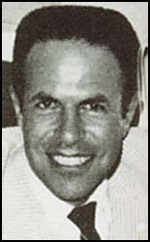Think of this as Volume 11, Number 8 of A-Clue.com, the online newsletter I’ve written since 1997. Enjoy.
One of the most annoying aspects of modern political coverage is this emphasis on process, tactics, and what looks like minutiae.
TeeVee talking heads keep telling us this is inevitable, as though their habits were a force of nature, like entropy. The point is made most forcefully by Chris Matthews, whose book "Life’s a Campaign" paints everything as artificial.
But this is not inevitable. This is not entropy. This had a beginning and it has an ending.
The ending is the major political story of 2008.
The beginning was The New Nixon. The idea was that Richard Nixon, twice-defeated, had become tanned, rested, ready, mature, a new man. Everyone on the press bus knew this was bull, but Nixon’s handlers, especially H.R. Haldeman (right), kept pushing the line, and eventually Nixon won. Tactics and image, it seemed, had triumphed over reality.
Ever since then political coverage has become all about artifice. More and more is written about less and less. Insiders care nothing for what a candidate really is, or really believes. They care only about the tactics, about how they will be portrayed, and how this portrayal can shift based entirely on how marketing people manipulate the media. They are, in other words, covering their own eternal bamboozlement, pretending that the lies of spokespeople are the only truth, and that reality has no substance beyond the never-ending ability to spin it.
We have lived a generation now with this bedrock political assumption. It is drilled into our politics as no policy is. And it’s time for it to stop, if a new era is going to actually take shape.
Here’s how we start.
Hillary Clinton didn’t lose.
This race was not about her, about what we thought of her, about how she portrayed herself. It was not a tactical race at all.
Hillary Clinton is a brilliant woman. She was the true Vice President in the 1990s. She says now she has been under the public spotlight for 35 years — that’s 7 years longer than Nixon’s entire career. She’s tested, she’s experienced. She’s been "in the arena."
What happened is she got beat. By a better organization, by a better message, by a better candidate. It’s really as simple as that.
Organization
Barack Obama’s campaign organization understood that the Internet is not the Web, that it’s not e-mail or YouTube. It’s connectivity. It’s the ability to collect, and make use of, massive amounts of data which connect a campaign to those who believe in it. It is, in other words, a way to organize people.
So the Obama campaign spent its early money wisely, not on polls but on the process of campaigning. Innovations like taking tiny donations at rallies as buy-ins, about manipulating enormous lists based on addresses, so that leaders could be created within every precinct and activated. About training those local leaders.
David Axelrod and his team took everything Howard Dean did right in 2004, everything he did at the DNC, and scaled it, while the Clinton campaign ran with a playbook of pollsters from 1992. That’s strategy, not tactics.
Message
Almost two months ago I asked, if Republicans were given an honest choice between Reagan and Nixon in 1968, which would they have chosen?
I think we know the answer now. They would have chosen Reaganism. And they would have been right.
Ronald Reagan embodied movement conservatism from the moment he nominated Barry Goldwater on TV, in 1964, until his death from Alzheimer’s in 2004. He was conservatism’s Franklin Roosevelt, its Abraham Lincoln. I get it. Had his ambition moved him to run for President from his 1966 election as Governor of California, he very likely would have won the nomination, and with it the election. He would have won much bigger than Nixon in fact won, neutering the appeal of George Wallace in the process. It would not have been unprecedented. Grover Cleveland became New York’s Governor in 1882 and President two years later. Abraham Lincoln lost his Senate bid in 1858 and won in 1860. Dwight Eisenhower had never been elected to anything before becoming President in 1952. Same with U.S. Grant.
It was the message of Reaganism, echoing and amplifying that of Barry Goldwater and the think tanks around him, which mesmerized people. It was a perfect marriage of an actor and a part, we’re told now. But would any Republican today have had it any other way?
Barack Obama has done the same thing with the message of Howard Dean. He has embodied it, amplified it, extended it. This is probably why so many Republicans find Obama so attractive. In a time demanding transformation, which this is, which the 1960s were, a transforming message is what we need to hear.
Candidate
The process of running for President changes a person. Everyone who has done this agrees. They gain a greater appreciation for their message, for the American people, for the history of the country.
But no candidate in living memory has been transformed by a campaign the way Barack Obama has. He has grown before our eyes, sort of the way David Robinson grew at Navy. Had he been a seven-footer in high school Navy could not have recruited The Admiral. He was accepted and just sprouted, as did his game. As did, eventually, his humanity. Ask anyone in San Antonio.
Barack Obama has done something similar. He always had political talent. But he has grown into the role of Presidential candidate. His speeches have become steadily crisper, more pointed. Observers compare his rallies to rock concerts, but there’s no E Street Band here. It’s just The Boss.
At a time of transformation that’s what America needs, what it always seeks. And history has shown, time and time again, that we’re right to seek it. They’re just words, it’s just a performance. But that’s what we need if we’re to have the courage to act. We need to be inspired in the right direction, and Obama has learned to do this.
He is what we need. That is not an insult to her. That’s just the reality of our time. All the media reporting of this campaign is bull. Just as it was bull to ignore the selling of the President in 1968, it is bull to ignore the transformation of our nation today, a transformation embodied in the person of Barack Obama.












